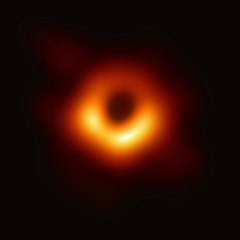A black hole is a region of space where gravity is so strong that nothing, including light, can escape its pull. It is formed when a massive star runs out of fuel and collapses under its own gravity, becoming incredibly dense and compact.
The point of no return around a black hole is called the event horizon, beyond which anything that gets too close will be pulled into the black hole and cannot escape. As matter is pulled into a black hole, it is accelerated to incredible speeds and heated to extreme temperatures, producing intense radiation and emitting jets of particles.
Black holes come in different sizes, ranging from small ones that are only a few times the mass of the Sun to supermassive ones that can be billions of times more massive than the Sun, which are found at the center of most galaxies, including our own Milky Way. While black holes are invisible to the naked eye, astronomers can detect them by observing the effects of their gravity on nearby matter or by detecting the radiation emitted by material falling into them.
Where are the nearest black holes to Earth?
The nearest known black hole to Earth is V616 Monocerotis, also known as V616 Mon, located in the Milky Way galaxy. It is approximately 3,000 light-years away from us.
Another nearby black hole is located in the binary system HR 6819, about 1,120 light-years from Earth. This black hole was only recently discovered in 2020, and it was found to be the closest black hole to Earth that has been detected so far.
However, it is important to note that black holes are notoriously difficult to detect, and there may be other nearby black holes that have not yet been discovered. Nonetheless, V616 Mon and HR 6819 are the nearest black holes that are currently known to astronomers.
Could black holes be wormholes?
There is a theoretical possibility that black holes could be connected to other regions of spacetime, such as through a wormhole. Wormholes are hypothetical objects that provide shortcuts through space and time, allowing objects to travel vast distances more quickly than would be possible through normal space.
One idea is that if a wormhole exists, it could be formed by connecting two black holes. This would require the black holes to be rotating and to have an aligned spin, which would create a gravitational field that could theoretically sustain the wormhole.
However, the idea of black holes being wormholes is still largely speculative and has not been conclusively proven or observed. Wormholes are not yet fully understood and their existence is purely theoretical, so the possibility of black holes being wormholes remains an area of active research and speculation.
Should we be worried about black holes?
As far as we know, there is no immediate threat from black holes that would directly impact our planet or our daily lives. Black holes are located very far away from us in space, and any effects they might have on us are indirect and highly unlikely.
However, black holes are among the most powerful and destructive objects in the universe, and their immense gravity can affect the behavior of nearby stars, planets, and other matter. For example, a star that gets too close to a black hole may be torn apart by tidal forces, leading to a phenomenon known as a tidal disruption event. Similarly, black holes can emit powerful jets of radiation and particles that can have an impact on their surroundings.
That being said, the chances of such events happening close enough to Earth to cause any significant harm are extremely low. Additionally, astronomers continue to study black holes and other cosmic phenomena to better understand their behavior and their potential effects on the universe.
In summary, while black holes are fascinating and powerful objects, there is no immediate danger to us from them. However, continued research and monitoring of these objects is important for furthering our understanding of the universe and its evolution.

